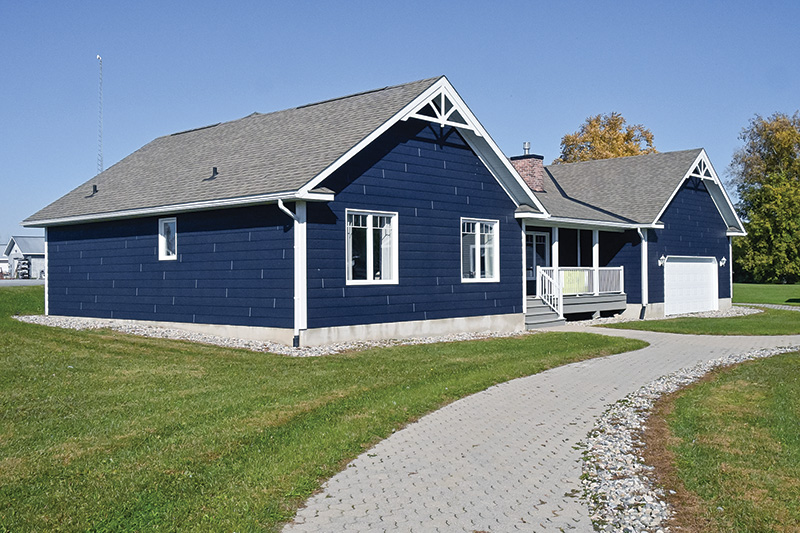Guildcrest Homes has model homes you can visit and walk through at their Morewood location. While the models change occasionally, the quality is always evident. Tinkess Photo
MOREWOOD – Guildcrest Homes been building high quality, energy-efficient modular homes since 1991 at their factory in Morewood, Ontario. You could be excused if you thought they had been around longer than that, and in one sense they were, but the company that exists today provides a far superior product than their predecessors. They do follow one similar production concept though: building indoors, out of the weather provides a better work environment and a much better finished product. It is something that thousands of homeowners of Guildcrest’s high quality homes across Ontario, Quebec and the United States have discovered.
Guildcrest has three company sales centres in eastern Ontario and a network of more than 20 Authorized Builders. They are active in several residential development projects and “Adult Lifestyle” communities and have developed a strong relationship with many of Ontario’s First Nations communities. For people in this area, Guildcrest Homes is what Morewood is known for.
Sean Kelly is Guildcrest’s retail sales manager. He says that like most builders, Guildcrest is adapting to changing demands of the marketplace so that they can be ready to respond quickly, both in price and selection.
“2024 was certainly different than 2023 in regard to the pendulum shifting a bit in regard to the product we’re building,” said Kelly during a recent open house at the company’s Morewood facility. “But the demand for the product is what people are demanding, so primarily over the past few decades, our core business has been single family homes. We’re now diversifying, because we’re trying to pivot to what the clients are looking for, which is multifamily homes. So, we see a lot more opportunities with the multifamily homes being presented to us. So that’s kind of what we’ve done, we certainly still do the single-family homes, but we’re starting to see more demand for ADUs.”
ADU’s (Additional Dwelling Units) are also known as tiny homes, garden suites, or granny flats, are small, self-contained secondary housing units that due to changes in the Ontario Building Code are showing up more frequently across the province to increase density of single-family residential neighbourhoods while providing a way for elderly family members to be close, while still maintaining a level of independence.
The pandemic provided several challenges for Canada’s home builders. Housing and material costs skyrocketed due to supply chain issues and increased demand by people who, if they had to stay home, wanted more room or amenities. Despite this, pricing at Guildcrest has been surprisingly constant.
“Here at Guildcrest, we have held through in our price for last two and a half years,” said Kelly. We see maybe a small increase in 2025, yet to be determined on what that’s going to be, if any. But we see that there’s obviously increasingly numbers that our commodities are coming in at. They’re going up. Fuel prices, you know, seem to have levelled out a little bit. Yes, that helps a little bit, but you continuously have labour costs that are on the rise.
“At Guildcrest, we’re fortunate, because we buy in bulk, we have more of a controlled cost, so we can, kind of… it’s almost like a lag time of a year. It helps us out, if we can kind of get a handle on our order forecast, pre buy, and then lock prices in, because Guildcrest versus other types of builder, we can lock that client in for the full year on that price. Any fluctuation throughout that year, we’ve absorbed that by either producing or providing marketable material that we have in reserve here.”
Because the cost of housing has put the dream of home ownership out of reach for many people, some are considering or reconsidering just how much they need, and that is something that Guildcrest is looking at for the future. You must be able to give the client what they want, but they also must be able to get something they can afford. In response Ontario is becoming more receptive to a lower minimum square footage, and that is a discussion that Guildcrest wants to be a part of.
“They’re starting to be a little more lenient on that,” said Kelly. “They see the need. They see the fact that people only have so much money at their disposal to be able to buy and there’s the need for housing. But what we’re having on our side is the need for housing. What we don’t have on our side is the complexity of cheap homes. That’s the problem. So hopefully the government will start to circle back and understand that.
“We need to come up with, develop a plan. The federal government came to see us last year, early last year, to help with, you know, you hear talk of the “strawberry homes” or wartime homes. We help with some input into the catalogue presentation. Not sure where that’s going to go. The government talking, I think that if they can fast track the approval process with the municipalities, which is certainly going to help close the gap on trying to find homes, getting people into homes.”
There is a sustainable housing crisis in Canada, and governments, while working with the best intentions do not move quickly. The private sector, thankfully, is doing what it can to be ready to help solve the problem. Who knows, when the decision is made, a solution might be ready to take shape in Morewood in the Guildcrest Homes factory.
If you would like to have a light shined on your business, please contact us at: editor@etceterapublications.ca or call us at 613-448-2321.

Terry Tinkess is a professional photographer, educator and journalist. He has been making a living with a camera and keyboard since 1999 and has been featured in such publications as The Ottawa Citizen, Cornwall Standard Freeholder, The Globe and Mail, The Miami Herald, Ottawa Construction News, The Ontario Construction Report, Ontario Home Builder Magazine, Reed Construction Data, Canadian Potato Business and most recently, The Record and Eastern Ontario AgriNews. Terry lives in Ingleside, Ontario with his wife Brenda, Mia the anxious Pittie and cats Wally and Chubbers.









